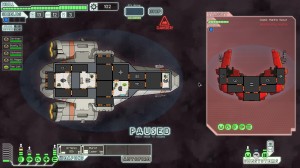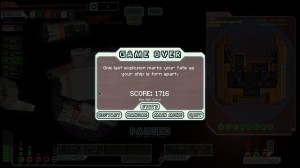
FTL: Because Losing is Fun
Uncategorized September 22, 2012
FTL
Platforms: Windows(GOG, Steam)/OS X(Steam)/Linux(Developer site)
Review Platform: OS X 10.8.1
You’ll Like It If You Like: Roguelikes, Oregon Trail
Website
Price: $9.99.
FTL was successfully Kickstarted on April 1st, 2012, is a space-based roguelike with real time micromanagement elements. If you’re not familiar with those terms, it’s Star Trek, but you’re the one wearing the Red Shirt. You control the Federation ship Kestrel, your mission is to deliver important information to Federation headquarters. The only thing standing in your way? The Rebel fleet pursuing you, space pirates, monsters, space-time anomalies, asteroids, and nebulae.
The genre name comes from Rogue, one of the oldest computer games. As with Rogue, each turn you’ll move on the star map to a new star system. Once there just about anything could be waiting for you. A rebel warship, an alien looking to trade, a distress signal or the start of a quest. The randomness gives the game a high level of replay value – no two games will be alike. There are more stars in each system than you can visit. The rebel fleet will close on you each turn, let them catch up and it’s game over, man. Game over. You can also lose if you run out of fuel, or by being destroyed in combat.
Combat is where FTL shakes up the formula a bit. Combat is done in real time. You’ll wait for your weapons to charge and target a specific system on the enemy ship. They’ll be targeting yours. If they pierce your shields, it can damage or destroy components such as shields, engines, oxygen, medical, weapons, or the flight deck. Managing power between these systems is a key to winning. You’ll never have enough reactor power to do everything. For instance, you might power down your medical bay in order to have extra power available for weapons or shields. Managing your crew is another important element in surviving your first combat.
You control the crew in real time too. You can send them to repair a damaged system, or place them at a station to give your ship a bonus in combat. For instance, stationing a crew member in the engine room gives your ship a bonus to dodge missile weapons. Should a fire break out, you can send a crewman to put it out, or open the airlock and drain the oxygen from the room the fire is in. Your crew is also useful in repelling boarders. Some enemy ships have boarding drones or teleporters that deposit enemy crew onto your ship where they can sabotage your ship from within. Your crew can fight them off. After combat, you’ll collect essential resources from the enemy vessel.
If you manage to survive until the end of the game, moving through eight sectors, you’ll fight the boss. This is the only part of the game that isn’t random. The boss, who you’ll fight in three phases, is a gigantic space battleship that will test you to the utmost. Expect to die the first time you meet it, and probably many times after. FTL isn’t fair.
Which is a breath of fresh air in a medium that increasingly eschews difficulty to increase sales. FTL is a fresh look at a classic game that will run on a toaster oven, and guarantees lots of replay value. For new players and longtime fans of the Rogue-like genre this is a must-buy.


